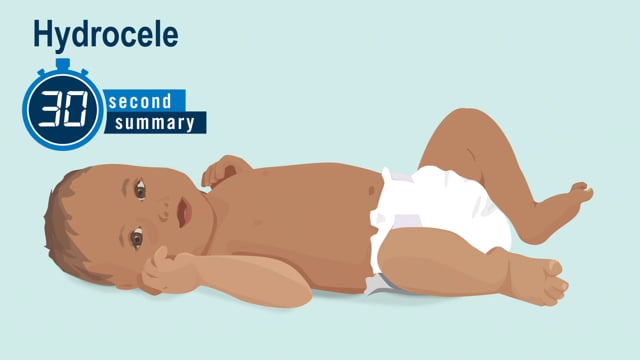Hydrocele
What Is a Hydrocele?
A hydrocele (HI-dro-seel) is a pouch of fluid around the testicle inside the scrotum. Hydroceles are common in newborns, especially in premature babies. Older boys and men can get them too.

30-Second Summary: Hydrocele
Learn the basics in 30 seconds.
What Are the Signs & Symptoms of a Hydrocele?
A boy with a hydrocele has a bulge in the groin or scrotum. You may or may not be able to see the bulge, but you or a doctor can feel it.
Hydroceles can temporarily change size when a baby cries or changes position.
What Causes a Hydrocele?
Normally, when a baby boy is developing in the womb, his testicles start to form in his abdomen or belly. Then the testicles move through a "tunnel," called the inguinal canal, into the genital area. As they move through the canal, they push belly lining along with them. The lining forms a pouch around the testicles inside the scrotum. The top of the pouch eventually closes up before birth.
Sometimes when the testicles and lining move together into the scrotum, fluid stays in the pouch. This is called a hydrocele.
There are two kinds of hydroceles:
- A communicating hydrocele is open at the top, so fluid can flow in and out of the belly.
- A non-communicating hydrocele is closed at the top, so fluid stays trapped in the scrotum.
How Is a Hydrocele Diagnosed?
Usually a doctor diagnoses a hydrocele with a physical exam. Sometimes the doctor may order imaging studies such as an ultrasound to confirm the hydrocele or rule out other conditions, such as testicular torsion or an inguinal hernia.
How Is a Hydrocele Treated?
How doctors treat a hydrocele depends on the type and location of the hydrocele, the patient's age, and other things.
Hydroceles in babies usually go away on their own by the time a child is 1–2 years old. If the hydrocele doesn't go away or if it happens with another condition (like a hernia), surgery may be needed.
How Can Parents Help?
If your child has a hydrocele or has had one repaired:
- Follow the doctor's advice about any follow-up visits.
- Watch the hydrocele for any changes, and let your doctor know if you notice any.
What Else Should I Know?
Hydroceles rarely affect a male's ability to have children later in life.


